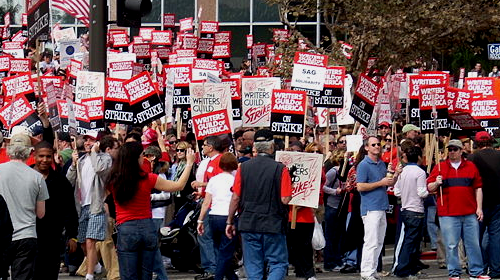The Hollywood writers strike that began on May 2, 2023, has entered its second week with no signs of a resolution. The Writers Guild of America (WGA), which represents more than 11,000 screenwriters in the United States, is demanding better pay and working conditions from the Alliance of Motion Picture and Television Producers (AMPTP), which represents the major film and television studios of Hollywood.
The strike has already affected the production of many popular shows, such as Stranger Things, Saturday Night Live, and Late Night with Seth Meyers, which have either paused filming or gone off the air. Analysts are predicting that the strike could last for months and cost the entertainment industry billions of dollars in lost revenue and viewership.
One of the key issues that has emerged in the negotiations is the use of artificial intelligence (AI) in the creative process. The WGA wants to regulate the use of AI on creative projects, stating that “AI can’t write or rewrite literary material; can’t be used as source material; and contract-covered material can’t be used to train AI.”
Workers vs. AI
The writers are concerned that the studios might use AI to replace human writers or exploit their work

without proper compensation. They are especially wary of generative AI tools like ChatGPT, an AI-powered “chatbot” that can produce coherent texts on various topics based on a few words or sentences as input. ChatGPT has been praised for its ability to mimic human language and style, but also criticized for its ethical and legal implications.
The AMPTP, however, has rejected the WGA’s proposal on AI, offering only to hold annual meetings to discuss advancements in technology. The studios argue that AI is still an emerging and evolving field that cannot be regulated by a contract. They also claim that AI is not a threat to writers, but rather a tool that can enhance their creativity and productivity.
“AI raises hard, important creative and legal questions for everyone,” the AMPTP said in a statement. “We believe that these questions are best addressed through dialogue and collaboration, not through rigid and restrictive rules that stifle innovation and limit artistic freedom.”
Now or Never?
But many writers are not buying the studios’ stance. They fear that the studios are trying to avoid making any commitments on AI and will use it to their advantage in the future.
“The technology is moving so fast and will move even faster than we can anticipate, and that is why we have got to deal with it in this negotiation,” said Marc Guggenheim, a co-creator of the superhero shows Arrow and DC’s Legends of Tomorrow.⁶
Guggenheim added that he has seen firsthand how AI can affect writers’ work. He said that he once used ChatGPT to generate a script for fun, and was surprised by how well it mimicked his style and tone. He said he was also disturbed by how easily it could plagiarize existing material without attribution.
“I don’t want to sound like a Luddite or a technophobe,” he said. “I think AI can be a wonderful tool for writers, but it has to be used responsibly and ethically. And right now, there are no safeguards or guidelines for that.”
“Let us work!”
The WGA and the AMPTP are expected to resume talks this week, but both sides remain far apart on several other issues as well, including compensation, residuals, streaming rights, diversity, health care, and pensions. The strike is widely seen as a pivotal moment for the entertainment industry, which has been undergoing major changes due to the rise of streaming platforms and new technologies.
As the strike continues, many writers are expressing their solidarity and frustration on social media and on the picket lines. They say they are fighting not only for themselves, but for future generations of writers who deserve fair treatment and respect for their work.
“We are not asking for anything unreasonable,” said Lena Waithe, a writer and producer of shows like Master of None and The Chi. “We are asking for what we deserve. We are asking for what we need. We are asking for what we love.”











